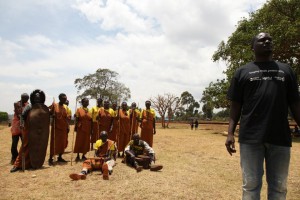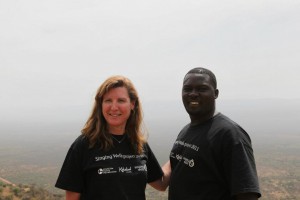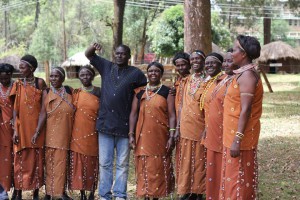‘Fifty Cows’ travelled with the Singing Wells project during the recording of the Kalenjin tribes in March 2012. He was our liaison contact with the music groups. Kathy interviewed him – here is his story…
The Interview
Fifty Cows is a Merekwet, part of the Kalenjin tribes. He organised for us to see singers from the Merekwet, Pokot and Tugen tribes. These are all sub-tribes of the Kalenjin. 
He was born in 1976 and grew up in a Merekwet village. His father was Merekwet and his mother was Pokot. His birth name is Kiplagat Kuambai. His grandfather was called ‘Fifty Cows’ because he was wealthy and had that many cows. His father was called ‘Son of Fifty Cows’ or ‘Fifty Calves’. Kiplaget got his nickname, Fifty Cows, when he went to school and has been called that ever since. In Swahili he is Tany (Cows) Konom (Fifty).His village was underdeveloped. He went to primary and secondary school near there. He says it was a very challenging upbringing, not only because of his obligations to herd cattle and till the fields but also because of ongoing fighting between the Merekwet and Pokot. He often had to take months off from school to work in the community and to fight.
From the age of eleven he was obligated to join the men of the village in their raids against the Pokot. He calls this war. The villages would gather approximately 1,000 men and travel to the Pokot to steal cattle and goats. They used guns and spears. They would steal up to 6,000 head of cattle on these raids. When he was younger he was more involved with the support of the older men but as he got older he also had to fight. The fighting was most intense in the 1980’s and early 1990’s. He says it was done in the name of honour or another ‘fictitious’ reason but in fact it was just stealing. The Pokot would retaliate and steal the cattle back. Often the fighting escalated with both tribes losing men and retaliating for their deaths. They did not fight over land. In the late 1990’s and early 2000’s the fighting decreased because there were less cows to fight over.
In Merekwet and Pokot tribes the men belong to a particular tribe but the women are not considered to be from just one tribe. They can migrate between the tribes without reprisal. They are considered “common property”. So even at the height of the conflicts the women could go from tribe to tribe and no one would even notice. When the Pokot came to the Merekwet villages, the women would feed them and make them feel at home. They were the peace keepers and sometimes the Pokot would turn back. The women wear a belt made from cowry shells. This belt denotes peace and is place on the woman’s abdomen during childbirth. When the fighting got very bad and the killing escalated the women would lay this belt down in the path of the Pokot. This acted as a ceasefire and the Pokot would always turn back. I asked why the women didn’t always use their belts and Fifty said they would only use them when the men weren’t adhering to the rules of war and it became too violent. Both tribes encouraged intertribal marriage. For example, Fifty’s parents were from different tribes. They felt this would promote peace.
In 1992, when he was just 16, he was shot in the forehead during a raid. The bullet cracked his skull and he had to be operated on in the field. They did not have anaesthetic but used a type of nettle to numb the skin. This effect only lasted a few minutes. Two strong men sat on him to keep him still and one held his head. The surgeon cut open the skin to get to his skull. With a primitive instrument he made small holes all around the crack and took off the piece of skull with the crack in it, about the size of peach pit. They did not think the crack would heal together unless they took out part of the skull. Then the skin was brought back together and sewn up. He describes this as the worst pain he as ever felt, much worse than circumcision which he had as a teenager. He did not pass out though and was considered very brave. The wound was healed in four months. There was no problem with post operative infection or other complications. The skull grew back together over time and he is now left with a significant dent in this right forehead and large upside down T shaped scar.
 Interestingly, in modern medicine a hole is also made in the skull if it was cracked to release any pressure from bleeding around the brain or swelling of the brain due to inflammation or bleeding in the brain itself. A metal plate would be used to cover the hole and there would be a slightly better cosmetic result. The basic medicine is the same though. Although we would use general anaesthesia!
Interestingly, in modern medicine a hole is also made in the skull if it was cracked to release any pressure from bleeding around the brain or swelling of the brain due to inflammation or bleeding in the brain itself. A metal plate would be used to cover the hole and there would be a slightly better cosmetic result. The basic medicine is the same though. Although we would use general anaesthesia!
It was honourable to fight for his community and he was given cows for his bravery. He sold these cows to pay for his school fees. In 1996 he went to the Seminary to become a Catholic priest. He felt this would be a way to help promote peace between the tribes. He had too much experience with conflict and wanted a way to resolve it. He was involved with many peace negotiations between the Merekwet and the Pokot. Today he still goes to a yearly peace negotiation run by the Tegla Lorupe Foundation. Tegla Lorupe is a marathon runner and has won the London Marathon. She uses sport to woo the warriors away from fighting. She encourages using their strength and endurance in sport and not in violence.
He stayed at the Seminary for four years but eventually decided this was not the way to bring peace. Even though he is a Christian he did not feel the tribes would be convinced to put down their weapons in the name of Jesus. It wouldn’t make sense to them to stop fighting because Jesus wouldn’t want it and they might go to hell.
He then went to the Kenyan Institute of Mass Communication in Nairobi. He got a diploma from there. He worked on various radio and TV stations. In 2005 he founded Kass FM radio with a few others. He was a producer and presenter. He plays older Kalenjin music with a message to the youth. Their songs are about how to live a good life and be honourable. They are mainly from the 1950’s and 60’s and sound a bit like the Beatles. He doesn’t have recordings of older tribal music. He is the first Kalenjin to ever be a radio presenter. He also presents talk radio programs where people can discuss their opinions about politics and tribal conflicts. The radio is listened to by many across the Kalenjin tribes. Every hut will have a radio and what is said on the radio is far reaching and can be very influential. Kass FM International is broadcast from Washington DC.
In 2007 he was working at Kass FM radio when the conflict broke out between the Kikuyo and the Kalenjin and Luo. One hundred and forty people were killed including many civilians. Most of the fighting was in Eldoret and the poor slums of Nairobi. One of his colleagues, Joshua arap Sang was a radio presenter at Kass FM and incited the riots by telling the Kalenjin they should take their land back and how they’ve been treated unfairly. He encouraged them to kill civilians. He has now been indicted along with political leaders. He will be going to the ICC (International Crime Court) in The Hague for trial soon.
In 2010 he got a degree from Nairobi University in Journalism and Media, in particular in Developmental Communication. He feels the people of the villages need to be involved with developmental agendas. It doesn’t make sense to have people in Nairobi deciding what the villages need. For example the Nairobi leaders may think a village need clean drinking water when in fact they need better medical care. He is now getting a Masters in International Relations at the U.S. International University in Nairobi. He is focusing on conflict resolution. He wants to be a peace ambassador in Kenya using his childhood experiences as examples. He feels like much time and so many men were lost because of war. He is well known throughout the Kalenjin tribes because of his radio shows. 
Fifty Cows really enjoyed hearing the traditional music on this trip. He felt comfortable with the Merekwet and Pokot tribes we visited although he said it brought back memories of the fighting in his youth. He wants to use music to bring peace to the tribes. His dream is to arrange a concert on the Merekwet and Pokot boarder where singers and dancers from both tribes come together and perform. He feels this would bring a sense of unity and peace. He is a remarkable man and has used his past to shape his future and use it for good.
Posted by Kathy Allen
9th March 2012
